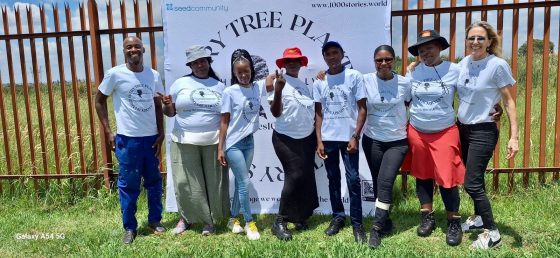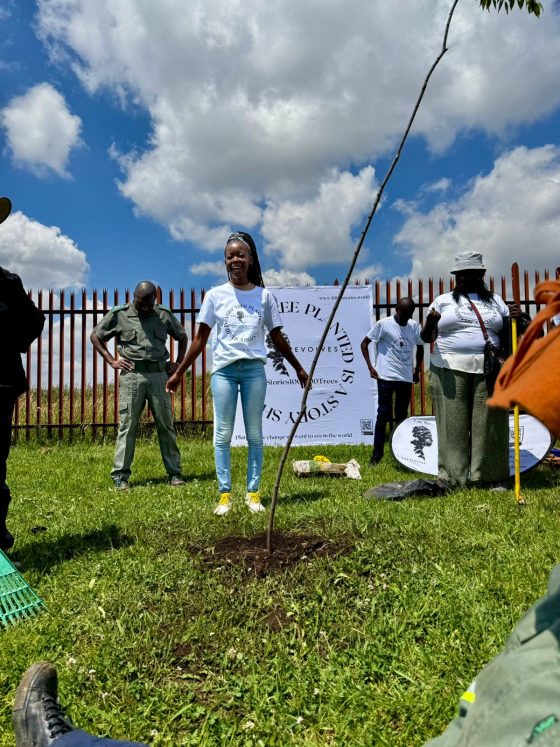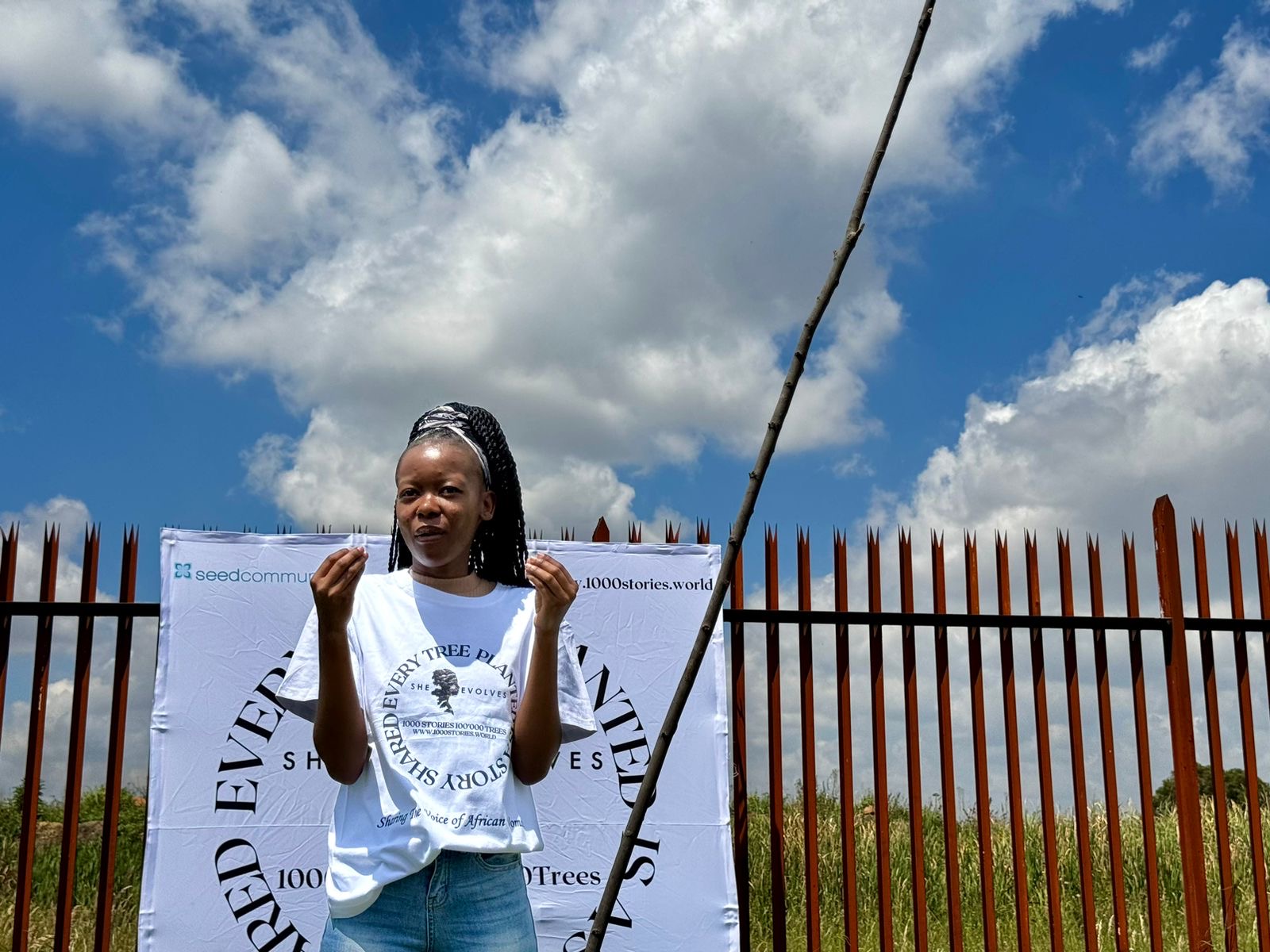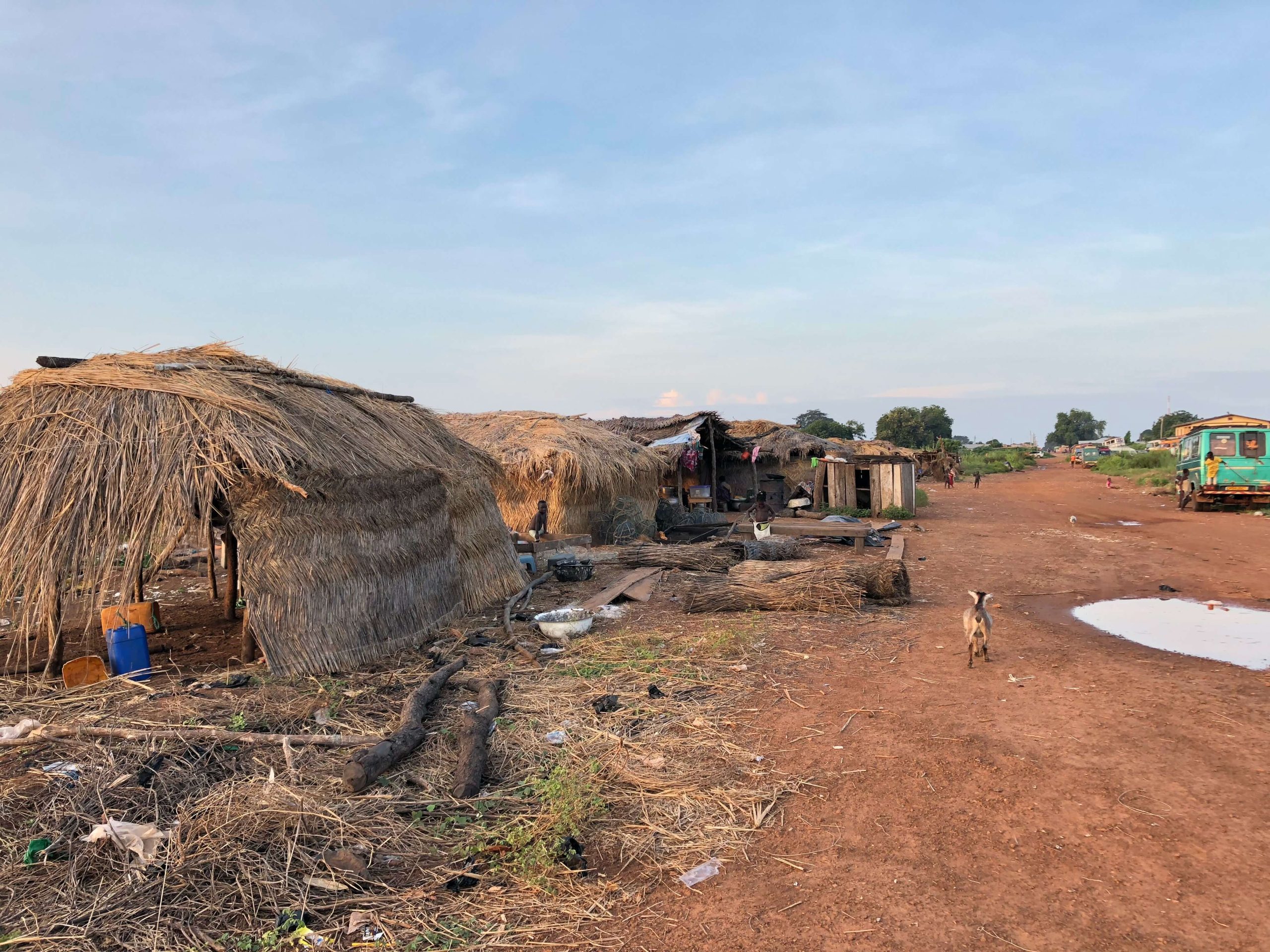Meet Naledi Mokgautsi, a Change Maker from Orange Farm
 Meet Naledi Mokgautsi, a young woman from Orange Farm, Johannesburg, South Africa. Naledi is a part of our project, She Evolves 1000 Stories 100 000 Trees, which aims to make the world a better place by planting trees and sharing black and brown African stories.
Meet Naledi Mokgautsi, a young woman from Orange Farm, Johannesburg, South Africa. Naledi is a part of our project, She Evolves 1000 Stories 100 000 Trees, which aims to make the world a better place by planting trees and sharing black and brown African stories.
In a nutshell... Naledi comes from a large family and has attended schools in various locations around Johannesburg before she went to university. She believes in always moving forward and helping others. She has volunteered her time in teaching children about computers and researching mental health.
Naledi is not just about work. She enjoys baking, drawing, and exploring new places. In fact, she runs a small dessert shop from her home and dreams of having a bakery combined with a bookstore one day. Her multifaceted personality is something that we can all relate to and draw inspiration from.
As part of the 1000Stories 100 000Trees initiative, Naledi has not only planted trees but also fearlessly shared her story with a diverse group of men and women at her former school, Laus Deo Primary. Her dream is to uplift her community and create a better environment for all. Naledi firmly believes that even the smallest actions, such as planting trees and sharing personal experiences, can lead to significant change.
However, Naledi is not stopping there. She has bigger plans to do even more for her community and travel the world. Recently, Naledi has engaged her community by helping them plant trees, raising awareness, and educating them about the importance thereof. Her favourite saying is "You gotta keep going," which reminds her to never give up, no matter how hard things get.
As a Changemaker, Naledi shows that anyone, no matter where they come from, can make a big impact and help others.
Naledi’s Story On Navigating Mental Health Challenges And Finding Purpose
Sometimes, we suffer in silence. I started having mental health issues at a young age, not knowing what they were exactly, and in turn, they formed part of my personality. These mental health issues then started being apparent in my early adult years; they were a manifestation of all my childhood traumas. I learned that I had depression and anxiety when I went to varsity and did more research on what I was going through.
I found that I had all the symptoms: I had no desire to live, I had given up and struggled with being in social situations and articulating what I wanted or needed, and I was very withdrawn and always very negative-minded. Because I was quiet, my mind was a dangerous place to live in. I then attempted to commit suicide with failure. I had a support system that tried their best to help me overcome this even though they didn’t understand what I was going through.
As time went on, I then started to read self-help books because I was tired of living in constant pain. I didn’t want to survive; I wanted to live. I drove myself out of the pit of depression even though it was a very long and tough battle. Today, I am happy I get to tell my story. There’s a lot that people go through and never get assistance or even self-help. Mental health issues are a very vital part of our overall health as they distort views of an individual in so many ways. It is important to keep healthy habits for our mental health so we can not only live but thrive.
If I were to offer advice to someone going through similar mental health challenges, my primary suggestion would be to find the root cause of their distress because mental health challenges often stem from deeper, underlying issues. Identifying what specifically triggers your emotional responses and understanding the reasons behind these triggers are crucial steps. Uncovering the ‘whys’ paves the way to addressing and resolving the core issues at hand. While this approach may prove beneficial for some, it’s important to acknowledge that it might not be effective for everyone.
Moreover, it’s important to allow yourself to experience and process your emotions fully – but refrain from acting impulsively on negative thoughts, as such actions can be harmful and sometimes even worse. Allowing yourself the space to express feelings such as sadness or anger is very important for releasing stress. For those who find it difficult to express emotions openly, journaling could be a helpful option.
Above all, if you’re struggling with mental health issues, I think it is important to be kind to yourself more than anything. Practice self-love through doing things that make you feel alive and happy. This helped me to find myself again and to find purpose in little things.
Diary of a Village Girl: Creating Hope in my Community
I have always had the urge to go back home to Malawi and be part of the builders of my community and the country at large. Though born and raised in Zimbabwe by Malawian parents, my love for Malawi developed when I arrived there in 2004, still a child yet old enough to know good from the bad.
I instantly fell in love with an odd way of life in my parents' villages, both my mother's and father's sides. I fell in love with the country's innocence, the people oblivious of a life other than their way of living. Indeed, ignorance sometimes is bliss. I was raised, in my view, in an average home with running water, a bathtub, electricity, a stove, a fridge, and sleeping on a bed. I naively thought that this lifestyle was a common way of life for everyone everywhere across the world. Sleeping on a mukeka or African mat in my parent's village in Malawi was not a shock but a roller-coaster adventure for me. Fetching water was the most exhilarating experience. Carrying tons of buckets with my cousins and brothers, contrary to our small family way back in Zimbabwe, I was faced with many cousins in Malawi, an unfamiliar sight, but it was such a pleasure. We would take turns swinging the borehole wheel until we filled all the buckets.
Cooking was quite exciting, and mealtime was beyond enjoyable. We sat amidst more than 20 people near the kitchen, chit-chatting while we waited for the food to be served. We had to sit in groups, males separate from females. Just as the mothers comprised their separate group, so did the children. Each group had to be served from a communal dish according to their gender and age.
After three months of this pleasurable village experience, my father took me back to Zimbabwe. I vowed in my heart that I would return. Years later, the nudge to return to Malawi was still stirring in me. In 2014, a mature woman, I decided to relocate and work in Malawi. By then, I understood that some of the first pleasant experiences I had encountered resulted from lack and poverty. I worked in Malawi for eight months, only to be so disappointed by the new experiences of hardships. The people and the country were going through tough times due to poor governance and political misalignment. At that time, I did not find anything pleasant about my country, so I left despite my inward-burning desire to help.
Subsequently, in 2021, I mentally prepared myself for disappointment and discomfort. I went to live in Tukombo, my parent's village in Malawi's Northern region. This village comprises of Tonga-speaking people, one of the tribes that pioneered multi-party rule through Aleke Banda and are also known to be the most intelligent and educated tribe in Malawi.
I realised that my community needed help urgently. So, I contacted the Traditional Authority (TA) of the land to help and found out which areas needed immediate attention. To my shock, I was given a Bible of needs, and with no financial resources, I felt helpless and hopeless. However, although hopeless, I was confident that I could reach out to some of my trusted and valued friends with whom I had built trustful relationships over the years based on our common interests, spiritual foundation, or vision of building the Africa we want. It is an Africa with a prosperous future for the present and future generations.
I embarked on a solo journey of knocking on every one of my friend's doors for financial assistance, hoping to have a good response. Indeed, most of my friends fell head over heels without hesitation in extending their financial resources in helping to build my village while building the Africa we want, one village at a time. Yes, there have been a few exceptions whereby I had some emotional wrecking experiences. Some potential donors I approached thought that I shouldn't be "appealing" for financial assistance at this stage in my life and that I was a failure and an embarrassment to society. Therefore, I should have never reached out to them or shared the philanthropic request work I was doing. Nevertheless, through various resources and help from friends, we have managed to renovate the village court/office, helped construct a nursery block, bought chairs for the community court and distributed food parcels and clothes to the community. Once the news started reaching out to some of the people in the diaspora who shared the same passion for building or facelifting the community, the response to contribute multiplied tremendously. Many reached out to me and expressed their commitment to joining hands to improve the village.
I partnered with my fellow brothers and sisters from Tukombo, mainly based outside the country, to extend the existing clinic into a hospital. Each person would contribute as little as US$6. With all this being done with a couple of close friends, the most mind-boggling question comes to mind: How does the government of Malawi fail to deliver on the smallest of services when a small group of friends can bring change within a couple of months? Where does our government fail in service delivery? What are the priorities in the national expenditure, and what should they be?
Meanwhile, Tukombo village has diverse so-called development committees that convene countless meetings, with little or no tangible deliverables on the ground. Is it because of a lack of focus on the bigger picture regarding vision, genuine sense of duty, unity for purpose, or unity of purpose? Could this be attributed to a lack of a shared mindset, education, drive or enthusiasm to live well in Malawi?
Unfortunately, despite the continent's immense potential, there are similar heart-wrenching cases across Africa. The abovementioned drawbacks pose unsurmountable obstacles to true meaningful emancipation and economic freedom. But we must face these challenges and forge a more livable and prosperous Africa. Our experience in Tukumbo village must help us to create a hopeful community with successful tangible development goals.
Written by:
Cathrine Banda, Community Activist
Tukombo Village, Nkhatabay, Malawi
Mobile: +265 881 69 30 58
Email: cathrinetwabi@gmail.com



